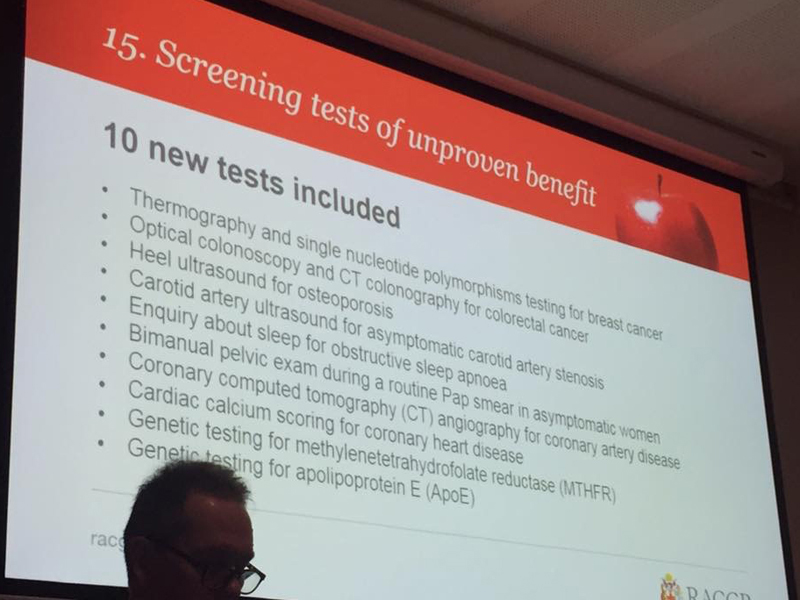Another 10 screening tests with unproven benefit have been added to the RACGP’s Redbook
Another 10 screening tests with unproven benefit have been added to the RACGP’s Redbook, the college revealed at the GP16 conference in Perth last weekend.
The update is part of the strategy to minimise practices that have no benefit, waste healthcare resources and could in fact be harmful to patients.
While the tests may have some benefit as diagnostic tests or to monitor disease, they are not recommended in low-risk or asymptomatic general practice populations.
These new additions include:
- Thermography and single nucleotide polymorphism testing for breast cancer – Thermography is associated with high false-positive and false-negative rates, and evidence does not support its use either for screening or as an adjunct to mammography. Single nucleotide polymorphism testing should only be undertaken after an in?depth discussion led by a clinical professional familiar with the implications of genetic risk assessment and testing.
- Optical colonoscopy or CT colonography for colorectal cancer – There is no current evidence of the reduction of CRC mortality, and neither are recommended for primary screening because there is no current randomised controlled trial (RCT) evidence of effectiveness in relation to any harms.
- Heel ultrasound for osteoporosis – No RCTs show any benefit of using heel ultrasound as the primary screening tool for osteoporosis, nor is its usefulness as a pre-screening tool in tandem with dual-energy X-ray absorptiometry proven.
- Carotid artery ultrasound to detect asymptomatic carotid artery stenosis – There is no evidence of patient benefit from screening, but there is evidence of harms, including significant procedural risk and cost. Carotid stenting cannot be recommended because it causes about twice as many strokes or deaths as carotid endarterectomy.
- Screening tools for obstructive sleep apnoea – No large-scale RCTs show the benefit or cost-benefit of routine screening for OSA in primary care.
- Bimanual pelvic examination during a Pap test in asymptomatic women – There is no proven benefit, and has been shown not to be an effective screening method for ovarian cancer detection.
- Coronary computed tomography angiography for coronary artery disease – Performing the test may have benefit in patients at moderate risk of CAD, but not in asymptomatic persons, those with known significant CAD or those with a high pre-test probability of CAD.
- CT calcium scoring for coronary heart disease – It is usually not appropriate in a low-risk asymptomatic population, but may be of possible value in risk reclassification in those at moderate risk.
- Genetic testing for methylenetetrahydrofolate reductase (MTHFR) – It has minimum clinical utility and is not recommended in the evaluation of thrombophilia, recurrent pregnancy loss, or assessment of risk of coronary artery disease or any other condition.
- Genetic testing for apolipoprotein E (ApoE) for Alzheimer’s disease – It has poor predictive value and there is a lack of preventive options.
Interesting new additions to @RACGP Red Book section on unproven preventive tests. These look good. @ChooseWiselyAU #GP16Perth pic.twitter.com/IdINrPb2O5
— Brett Montgomery (@brettmontg) September 30, 2016


